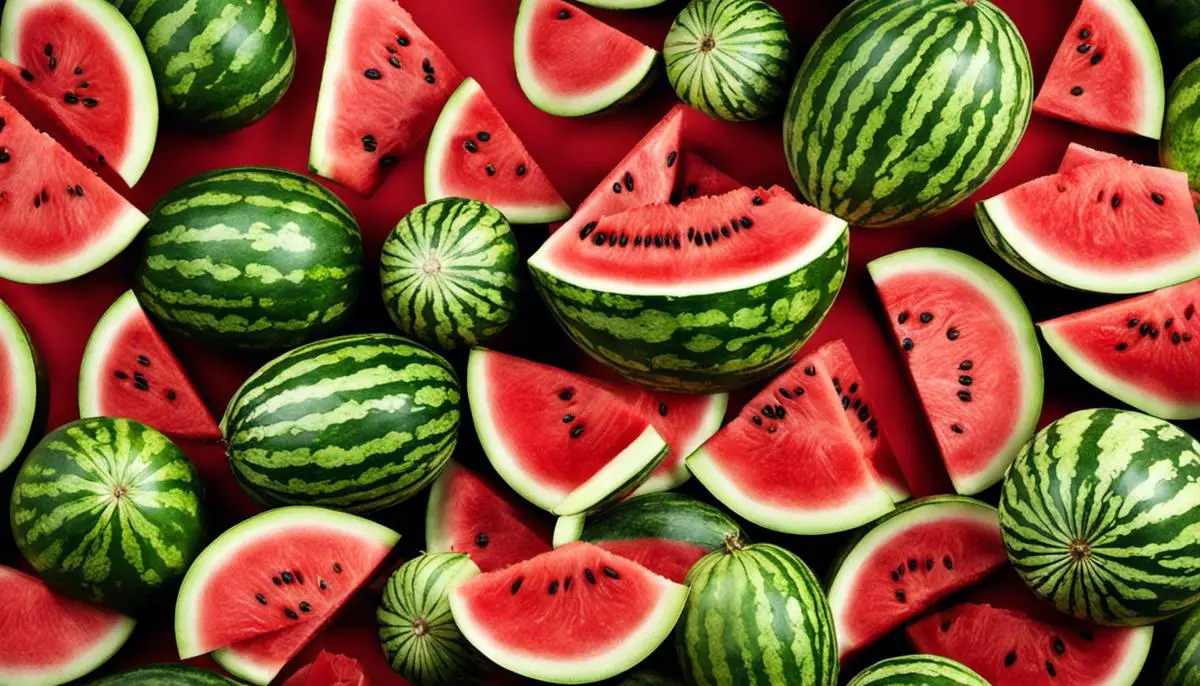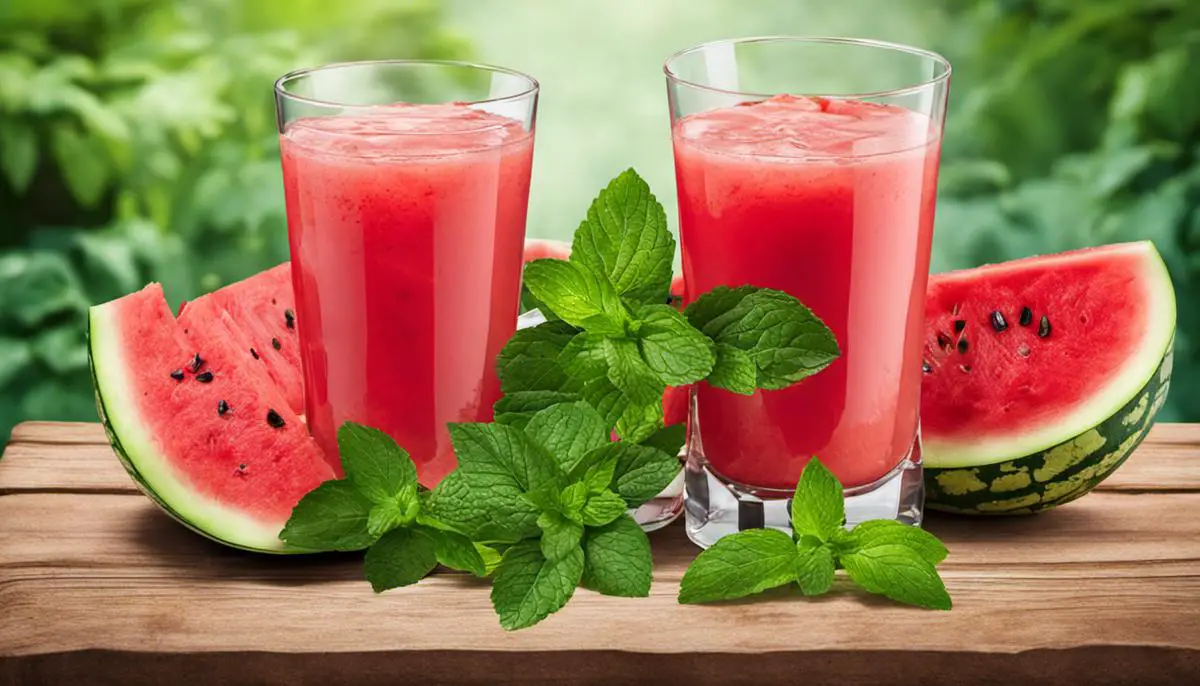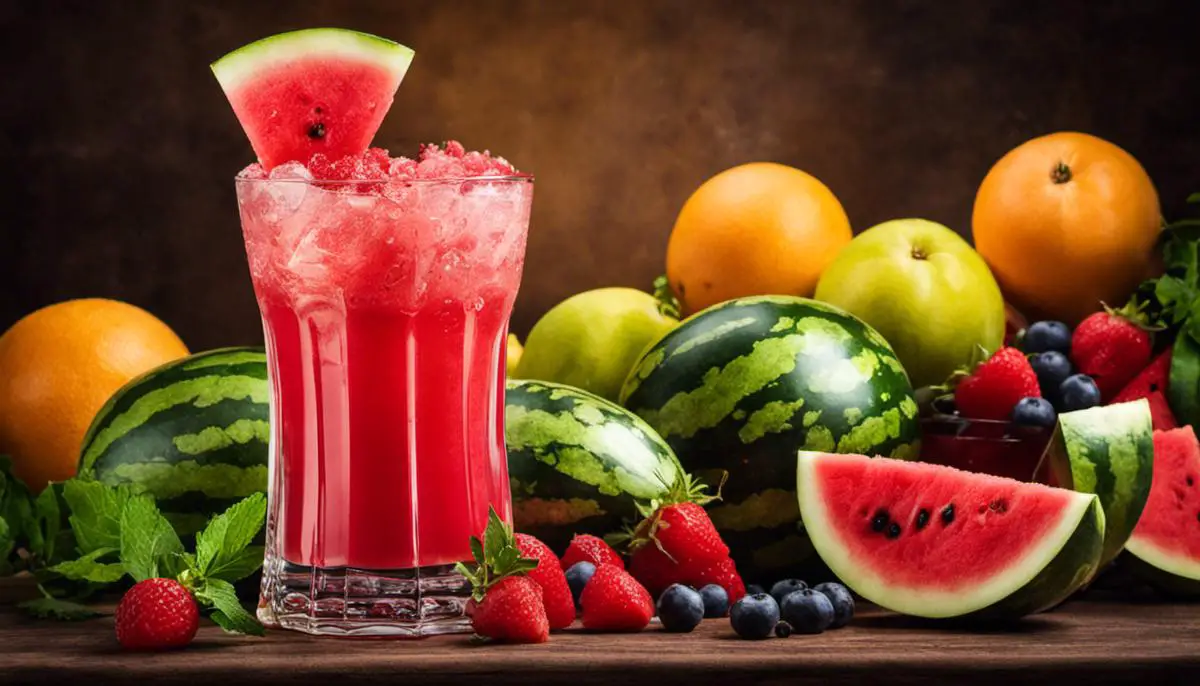Boosting the body’s hydration and packed with a bevy of vitamins and minerals, watermelon juice promises a refreshing and healthy treat. However, the key to an optimal concoction depends heavily on choosing the right fruit and having the right skills to extract its essence. This discourse focuses on critical aspects to consider when selecting the perfect watermelon and the diverse array of techniques one can use to juice it. Furthermore, in lieu of sugar which carries unwanted health implications, this piece will delve into natural sweeteners that will improve your watermelon’s natural sweetness in a more health-conscious manner.
Selecting the right watermelon
Choosing the Perfect Watermelon: It’s All in the Details
When going for a watermelon shopping spree, one of the most important factors to take into consideration is the color of the watermelon. A ripe watermelon often has a uniform green color, except for a patch known as a ‘field spot.’ The color of the field spot is a good indicator of the watermelon’s ripeness. For an adequately ripe watermelon, the field spot should be a creamy yellow color, not white or green.
Telltale Signs of a Ripe Watermelon
The weight of the watermelon also speaks volumes about its ripeness. Watermelons are mostly water. Thus, a ripe watermelon should feel heavy for its size. Whether you’re looking at smaller or larger watermelons, they should all feel dense and heavy. Also, when you pick up the watermelon, give it a tap. A ripe watermelon will produce a deep and hollow sound, indicating that it’s juicy and ripe.
When and Where to Get the Perfect Watermelon
For the best results to create your watermelon juice, aim to buy in season. Watermelons are typically harvested in late summer to early fall. During this period, chances are high you’ll get a remarkably ripe and juicy watermelon.
Also, remember to concentrate your shopping efforts to reputable grocery stores or local farmers’ markets, where turn over rate and quality control are well-maintained.
By employing these strategies in selecting the right watermelon, you ensure to have a watermelon so sweet and juicy, it will not require any additional sugar in your juice recipe. It’s not only about luck; it’s about knowing what to look for.

Juicing techniques
Using a Blender for Watermelon Juice
Extracting juice from a watermelon using a blender is the most common method. This approach is simple to understand and execute. First, cut the watermelon into cubes after removing seeds. Second, place the chunks into the blender and blend until it becomes a puree. After that, strain the puree to separate the juice from the pulp. The main advantage of the blender method is the ease of use and universally accessible tool. The drawback, however, is inconsistent results. The texture of the juice can differ based on how thoroughly you blend and strain the watermelon.
Using a Juicer
A juicer can quickly and easily extract juice from a watermelon. This method involves cutting the melon into pieces that can fit into your juicer’s feed tube, removing the rind, and then juicing the fruit. Despite being fast and providing a consistently smooth juice, this technique does hast its disadvantages. Juicers can be expensive and are not as readily available as a blender. Plus, it can be difficult to clean up afterward as watermelon fibers might clog the juicer’s filter.
Manual Extraction
Manual extraction of watermelon juice is the most labor-intensive method. It involves manually separating the watermelon flesh from the seeds, squishing it by hand, massaging it through a fine sieve, or pressing it with the back of a spoon to extract juice. The primary advantage of this method is it does not require any special equipment making it accessible to anyone. In contrast, it can be time-consuming and messy. Plus, it does not deliver as consistent an outcome as with a blender or juicer.
Comparison of Methods
Considering the advantages and disadvantages of different juicing methods, choosing the best method depends on what tools are available and how you value convenience versus control. Using a blender is most common due to its universality and ease of use but may not yield the most consistent results. The juicing method results in a consistently smooth juice, but the equipment can be expensive and harder to clean. Lastly, manual extraction requires no special equipment but is laborious and messy.
In conclusion
While there are a variety of ways to juice a watermelon without adding sugar, the final choice of method will depend on your available equipment, time, and personal preference. Although the blender and juicer methods may be quicker and easier, the manual method can be a rewarding process, with the added bonus of natural flavor retention.

Natural sweeteners
Healthy Alternatives to Sugar: Natural Sweeteners for your Watermelon Juice
A recipe for fresh, naturally sweet watermelon juice is incomplete without an exploration of healthier alternatives to refined sugar. When looking to add some sweetness to your juice, why not leverage the natural sugars found in certain fruits. Here are a few options for natural sweeteners to consider:
- Banana: Bananas are an excellent natural sweetener. They add a rich, sweet taste to watermelon juice without the need for added sugars. Use ripe bananas for maximum sweetness.
- Honey: Honey, particularly raw honey, is a natural remedy filled with numerous health benefits. It’s also an excellent sweetener.
- Coconut Sugar: Extracted from the sap of coconut palm trees, coconut sugar presents a healthier substitute. Unlike refined sugar, it retains some essential nutrients and has a lower glycemic index.
- Dates: Dates are rich in several nutrients, fiber, and antioxidants, making them an ideal choice. Make sure to remove seeds before blending in.
- Pineapple: A juicy pineapple can be a perfect sweetener for watermelon juice.
- Agave Nectar: This sweetener from the agave plant, which is native to the Southern United States and Latin America, is another alternative.
- Maple Syrup: Pure maple syrup, not the artificially flavored ones, can add a unique flavor and sweetness to your watermelon juice.
Adding Sweetness to Your Watermelon Juice Without Refined Sugar
In making your watermelon juice, choose a watermelon that is ripe and naturally sweet, preferably seedless. Cut it into chunks and blend until smooth. Depending on the sweetness of the watermelon, you might not need any additional sweeteners.
If you’d like to enrich the flavor and sweetness a bit more, you can consider adding some of the natural sweeteners mentioned above. Banana, dates, or pineapple can be added straight to the blender with your watermelon. Honey, agave nectar, maple syrup, or coconut sugar can be stirred in after the juice is poured into your glass.
Remember to adjust the quantities of sweeteners according to your taste and health preference. Remember that the goal is to enjoy a refreshing watermelon juice without the overpowering sweetness and potential health concerns of refined sugar.
Tip: Balance Your Flavors
Balancing your flavors is equally important to make your “no sugar” watermelon juice enjoyable. Adding a squeeze of fresh lemon or lime juice can bring a certain tartness to balance the sweetness of the fruits and other natural sweeteners. Adding fresh mint leaves can also give a refreshing, cooling effect, especially during hot summer days.
In summary, there’s no need to use refined sugars to enjoy your watermelon juice. Natural sweeteners provide a better, healthier alternative and are also easily accessible. Remember, balancing the sweet and tart flavors will make your juice all the more enjoyable.

The power of a good watermelon juice lies in the hands of the preparer. Mastering the technique of selecting the perfect watermelon and having the skills to juice it are critical for a delicious, refreshingly sweet drink. Incorporating natural sweeteners helps straddle the delicate balance between health and taste, enhancing your watermelon drink without the need for added sugars. Therefore, the end goal should always be to extract the maximum goodness from this brilliant fruit, while keeping it pure, natural, and devoid of any unhealthy components. With the perfect blend of technique and natural sweeteners, your watermelon juice will always be the perfect drink to meet your thirst and vitality needs.
